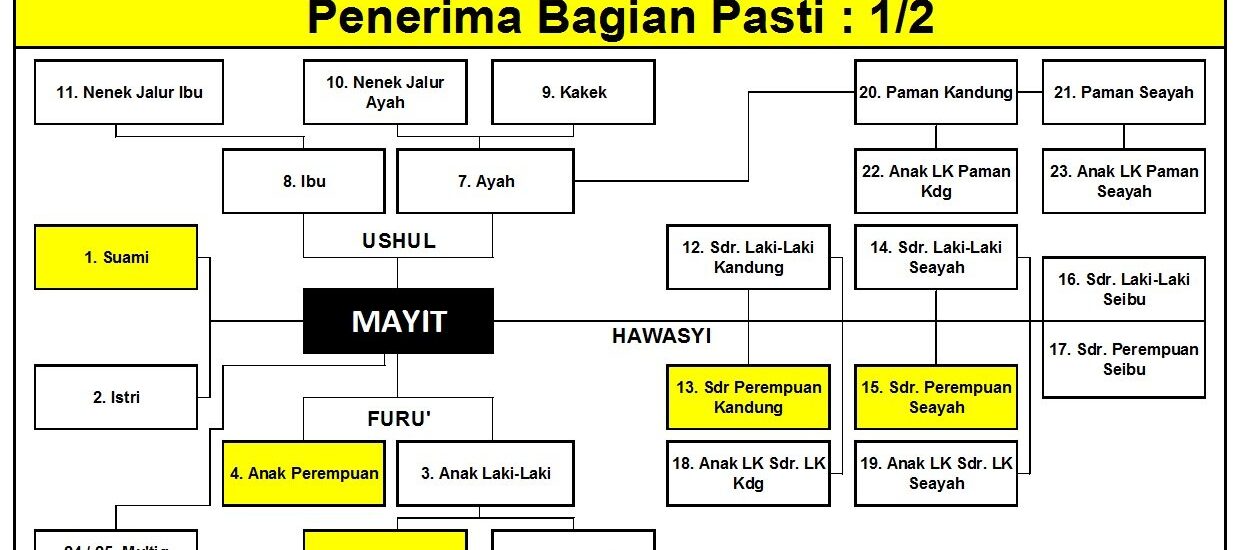In the realm of inheritance, understanding the distribution of a deceased person’s assets is crucial. Ahli waris yang mendapatkan bagian seperdua (1/2) dari harta pusaka adalah pasangan suami atau istri yang sah, serta anak-anak yang berhak mendapatkan bagian tersebut jika tidak ada pasangan yang tersisa. This division ensures that family members receive their fair share, fostering harmony during a challenging time.
Knowing who qualifies as an “ahli waris” helps clarify the often complex legal landscape surrounding inheritance. Each situation can vary, but understanding these fundamental principles makes navigating the process smoother for everyone involved.
Ahli Waris yang Mendapatkan Bagian Seperdua (1/2) dari Harta Pusaka adalah
When it comes to inheritance laws, understanding the distribution of assets can sometimes feel overwhelming. In many cultures, particularly in Islamic law, the concept of inheritance is clearly defined. One important aspect is the distribution of assets to heirs or “ahli waris.” Some heirs might receive a larger share, while others receive a smaller fraction. In this article, we will explore who the heirs are that qualify for a share of half (1/2) of the deceased’s estate, and what that entails.
The Basics of Harta Pusaka (Inheritance)
Before delving into who receives half of the estate, let’s clarify what harta pusaka means. In simple terms, harta pusaka refers to the property, assets, and wealth left behind by someone who has passed away. This can include:
- Real estate, such as homes or land
- Cash and bank accounts
- Investments like stocks and bonds
- Personal belongings, including jewelry and art
The distribution of this harta pusaka is governed by specific legal frameworks, which can vary significantly depending on the applicable laws in a particular region or cultural context.
Islamic Inheritance Laws
In Islamic tradition, inheritance laws are derived from the Quran and Hadith. These laws specify the shares each heir should receive. For instance, a spouse might receive a certain portion, while children receive another. Understanding these laws is vital for determining who gets what, particularly when it comes to the share of half (1/2).
The Role of the Spouse
One of the primary heirs entitled to receive half of the estate is the wife or husband. Here’s how it works:
– If a man passes away and leaves behind his wife, she is entitled to receive one-quarter (1/4) of the total estate if there are children. However, if there are no children, she receives one-half (1/2) of the estate.
– Conversely, if a woman passes away and leaves behind her husband, he is entitled to receive one-half (1/2) of her estate regardless of whether there are children or not.
This represents the idea of support and partnership in the marriage, ensuring that the surviving spouse is taken care of.
Children’s Shares
Children are also significant heirs in terms of inheritance, though their shares differ from the spouse. Generally:
– Sons receive double the share of daughters. For example, if a father leaves behind a total estate of 100 units, and he has one son and one daughter, the son would receive 66.67 units (2/3 of the estate), and the daughter would receive 33.33 units (1/3 of the estate).
However, the concepts of half (1/2) particularly apply when there is no other significant heir. Here, a son might receive half of the estate if there are no siblings or only one sibling (a sister), supporting the idea of equity among heirs.
The Impact of Debts on Inheritance Shares
Another critical aspect to consider is how debts affect the inheritance shares. Before distributing the harta pusaka, all outstanding debts of the deceased must be settled. This can directly impact the amount available to each heir.
– **Settling Debts:** Once the debts are paid, the remaining assets are divided among the heirs based on the predefined shares.
– **Example of Debts Impact:** If a deceased individual had an estate worth 100 units but 30 units in debt, the total value for distribution becomes 70 units. The heirs would then receive their shares based on this adjusted total.
Understanding this process helps heirs manage their expectations and prepares them for any changes in their anticipated share.
Factors Influencing Inheritance Distribution
While many of the rules governing inheritance are relatively fixed, there are several factors that can influence how assets are distributed:
The Presence of Wills
A will is a legal document that outlines how a person wants their assets to be distributed upon death. If a valid will exists, it can change the typical distribution rules:
– **Custom Distribution:** The individual creating the will can specify different shares for each heir, as long as it complies with the local laws.
– **Legal Challenges:** Wills can be contested, which may delay or alter the distribution process.
Family Dynamics
Family relationships play a significant role in inheritance distribution. Factors such as:
– **Estrangement:** If family members are not on good terms, this can impact the distribution, leading some heirs to decline their share altogether.
– **Dependents:** Individuals who were financially dependent on the deceased may have specific rights to compensation or support that could influence shares.
State Laws and Regulations
Each region or country has its own laws concerning inheritance. These laws can impact:
– **Court Involvement:** In some areas, if heirs cannot agree on the distribution, they may need to involve the courts to resolve disputes.
– **Community Property Laws:** In places with community property laws, assets acquired during marriage are often shared equally between spouses, affecting how the estate is divided.
Understanding who qualifies as an “ahli waris” receiving half (1/2) of the harta pusaka is crucial for navigating the intricate world of inheritance. Knowing the rights of spouses, children, and the impact of debts can provide clarity in what may be a challenging situation for many families. The distribution of harta pusaka is more than just a legal matter; it encompasses emotional aspects and family dynamics that need thoughtful consideration. By being informed, heirs can approach the process with a sense of preparedness and understanding.
tata cara menghitung & membagi warisan dalam hukum islam, ahli waris asobah dan fard, fiqih
Frequently Asked Questions
“`html
Who are the eligible heirs that receive a half share of the inheritance?
In the context of inheritance law, the heirs who may receive a half share (1/2) of the estate typically include the spouse of the deceased and the children. When the deceased leaves behind a spouse, that spouse is entitled to receive 1/2 of the estate, while the remaining portion is divided among the children or other heirs according to the applicable inheritance laws.
What factors determine the portion of inheritance an heir receives?
The portion of inheritance an heir receives depends on various factors, including the familial relationship to the deceased, the presence of a will, and the specific laws governing inheritance in the jurisdiction. In many cases, immediate family members such as spouses and children have priority and receive larger portions, while more distant relatives may receive smaller shares.
Can the distribution of inheritance be altered by a will?
Yes, a will can significantly alter the distribution of inheritance. If the deceased left a will that specifies how their assets should be divided, the heirs will receive the portions as dictated by the will, provided the will is valid. However, certain legal protections may still ensure that spouses and children receive their entitled shares, depending on local laws.
What happens to the inheritance if there are no immediate heirs?
If there are no immediate heirs, the estate may pass to more distant relatives or, if no relatives can be found, it may ultimately escheat to the state. The laws governing inheritance without immediate heirs can vary by jurisdiction, so it’s important to consult local regulations to understand the specific outcome in such cases.
Are there any exclusions where an heir does not receive their share?
Yes, certain circumstances can exclude an heir from receiving their share of the inheritance. For example, if an heir is found guilty of causing the death of the deceased, some jurisdictions may disqualify them from inheriting. Additionally, if the deceased explicitly disinherited an heir in their will, that heir would not receive any portion of the estate.
“`
Final Thoughts
Ahli waris yang mendapatkan bagian seperdua (1/2) dari harta pusaka adalah mereka yang diatur dalam hukum waris. Biasanya, ini mencakup pasangan suami atau istri, serta anak-anak. Pembagian ini memastikan bahwa masing-masing ahli waris mendapatkan hak yang adil atas harta yang ditinggalkan. Memahami siapa yang berhak mendapatkan bagian ini membantu mencegah sengketa di antara ahli waris.






